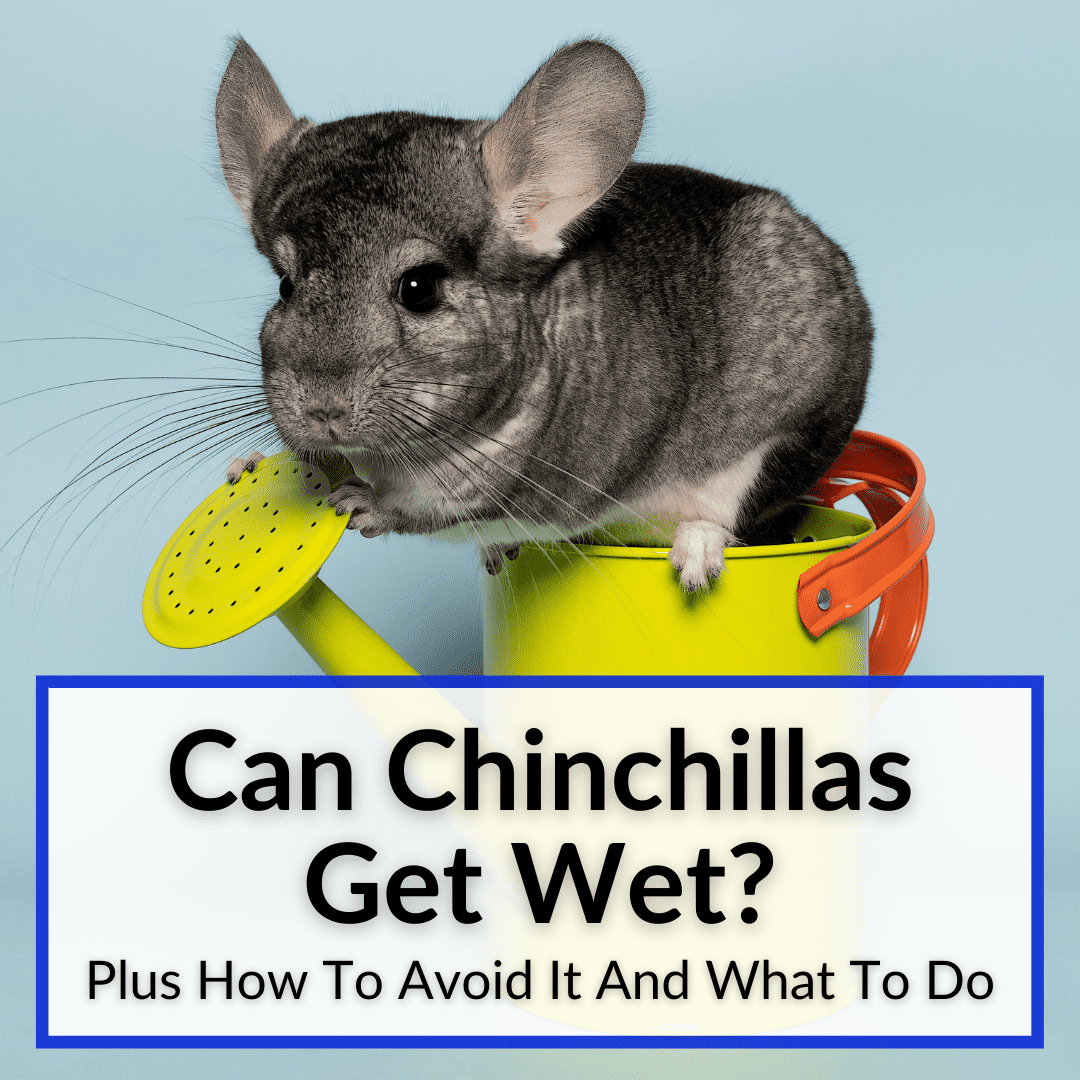
You may have also seen photos or videos of people bathing their chinchillas.
What gives?
Can chinchillas get wet for baths, but not at other times?
And why should they not get wet?
What happens if they do?
And what do you need to do?
Keep reading. All of these questions will be answered below. We’ll cover absolutely everything you need to know about chinchillas getting wet.
Contents
Can Chinchillas Get Wet?
No, chinchillas should not get wet. They cannot take traditional baths in water. If a chinchilla gets wet, it can cause fungal infections and other illnesses.
If your chinchilla does happen to get wet, you need to do what you can to remove any water or dampness.
In most situations, you will not have any issues with this, because chinchillas do not typically get wet for any reason. Nor should they.
But it is important to understand what to do if your chinchilla does get wet, and to understand some common reasons why they may get wet in the first place.
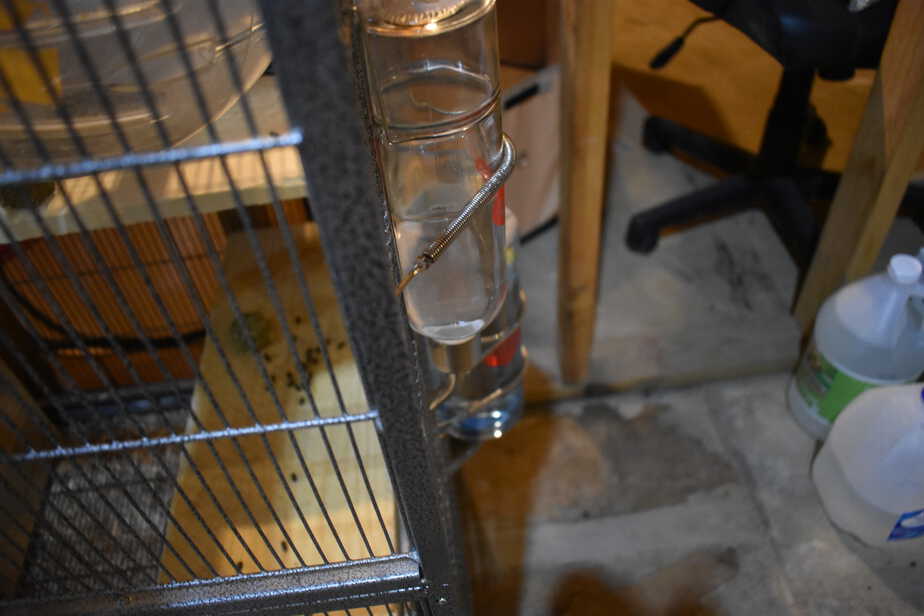
That is exactly what we will cover in the rest of this brief post.
Hopefully, by the end of this post, you will have a clear understanding of the dangers of getting a chinchilla wet and how to wash your chinchilla without water and keep it in top shape the correct way.
😕Adopting and caring for a new chinchilla can be intimidating and confusing. But it does not have to be.
Be sure to check out my full digital eBook “Avoiding Critical Mistakes: Ultimate Chinchilla Care eBook” for the best advice, tips, and tricks and supply recommendations to make adopting and caring for a chinchilla much more comfortable and easier to understand.
You can learn more about this eBook offer using the link directly below.
Learn more here:👉 Avoiding Critical Mistakes: Ultimate Chinchilla Care eBook Offer
Why Chinchillas Can’t Get Wet
Chinchillas and water do not get along. That is why a chinchilla should never get wet. Ever.
With over 80 hairs per follicle, these rodents have the densest fur of any land animal. I can’t blame them for not wanting any water in or around these dense coats of fur.
Even small amounts of water can remain damp on a chinchilla for hours (more on this later). The denseness of the fur makes it virtually impossible for it to dry out.
The dense fur is also the main reason chinchillas have problems handling heat and have the inability to sweat.
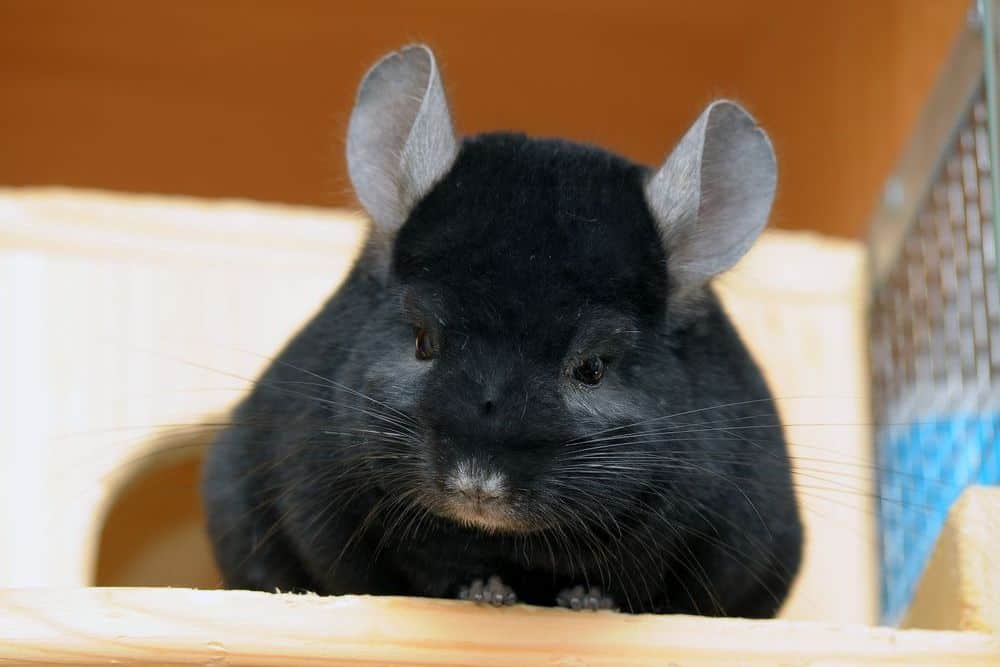
If a chinchilla does get wet, the fur will become matted down, thick, and almost clumpy.
When a chinchilla remains wet for too long, you begin running into other issues. There are number of illnesses that your chinchilla may develop.
Not to mention, it’s not comfortable for a chinchilla to get wet or remain wet for any duration of time. Don’t expect your chinchilla to be overly happy or friendly if it does get wet.
At least until you have fixed the situation. We will discuss how to do that here shortly.
First, let discuss baths. Since they can’t get wet, you obviously can’t bathe your chin in water like you would other pets.
Avoid Water Baths
New chinchillas owners are often curious if chinchillas can have a water bath, given that they should not get wet..
The answer is no. You should not wash a chinchilla in water. As already mentioned, they just can’t get dry once they are wet.
A water bath runs the risk of your chinchilla getting fungal infections, respiratory infections, and simply makes your chinchilla extremely uncomfortable.
Instead, give your chin dust baths!
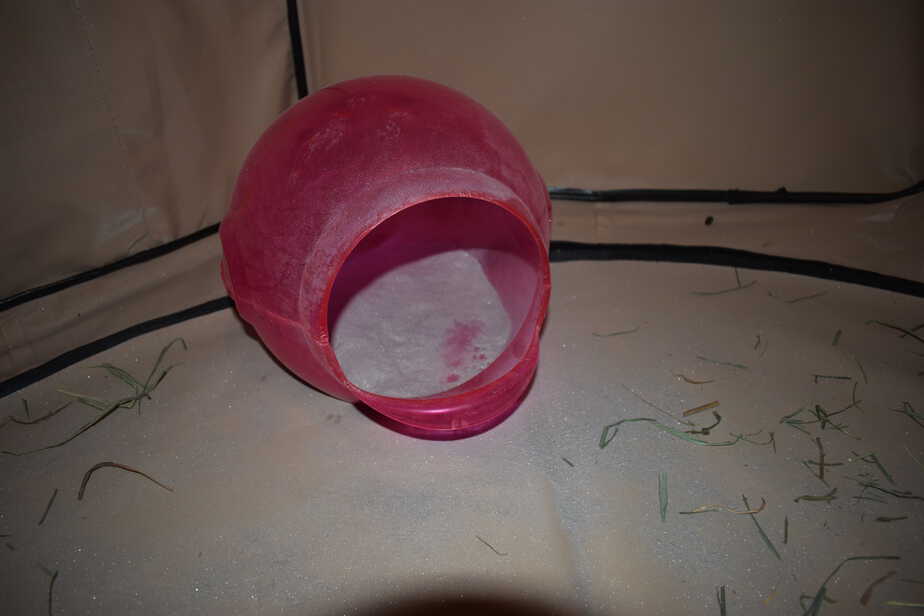
That’s right, all you need to keep your chinchilla clean is some dust. But before you go outside and gather whatever dust you can find, know that you need specialized chinchilla dust.
The good news is that even the best chinchilla dust brands on the market are very inexpensive.
The same goes for top quality dust bathhouses. Plus, you could just use a regular bowl, though that does get a bit messier.
So now you know. The solution to never using water on your chinchilla is simply to offer it regular dust baths. 2 to 3 per week is ideal.
Dust baths are very similar to what your chinchilla is accustomed to in the wild. It is how chinchillas manage to remain clean without ever touching water.
The specialized dust designed for chinchillas absorbs oils and keeps your chinchilla odor-free.
All you need to do is place the dust inside of a chinchilla dust bath bowl and let your pet out of the cage.
Be sure that your chinchilla is in a safe room where it won’t run away. You also want to use a room that has been chinchilla proofed to avoid injuries or other potential harm.
Again, a simple dust bath will keep your chinchilla smelling clean, looking clean, and avoid ever running into the potential hazards that water can present to your furry and cuddly chinchilla.
What Happens If A Chinchilla Gets Wet
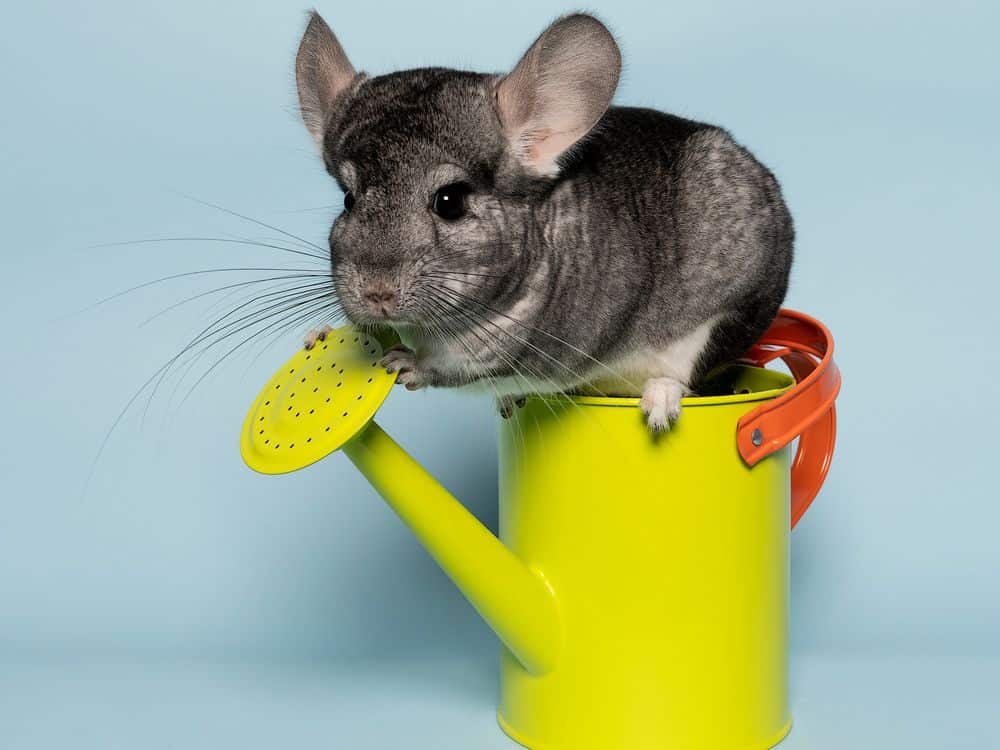
Extended durations of being damp or wet can bring on illness or fungal infections.
It is very difficult to dry your chinchilla after becoming wet. That makes the chance of viral infection or another illness taking hold even higher.
I know that sounds bad, but if it does happen, do not panic.
We are going to cover what to do if your chinchilla gets wet here in just a moment.
But first, I want to emphasize that anytime you think your chinchilla has the chance of becoming ill due to becoming wet, you should contact your vet.
They are going to offer the best solutions for any possible illness that may occur. It is important to get ahead of this, because the sooner you can intervene and get this taken care of, the better.
What To Do If Your Chinchilla Gets Wet
If a chinchilla gets wet in the wild, it is out of luck. But in captivity, you can help your pet if it gets wet and prevent any negative effects.
One of the most common reasons a chinchilla gets wet unintentionally is due to their water bottle dripping or leaking on them.
This can happen. Ideally, your chinchilla quickly moves from the water path, limiting how wet it gets. But sometimes they get completely soaked.
Before diving into what to do once your chinchilla is wet, I want to emphasize that you should regularly check the water bottle for any issues such as excessive dripping or leaking.
It happens quite frequently and can easily be fixed by simply getting a new water bottle.
If your chinchilla does happen to get wet for whatever reason, be sure to dry it adequately and as quickly as possible.
I am not sure why other blogs state never to use a blow dryer, but you certainly can, if your chinchilla is wet enough to be concerned.
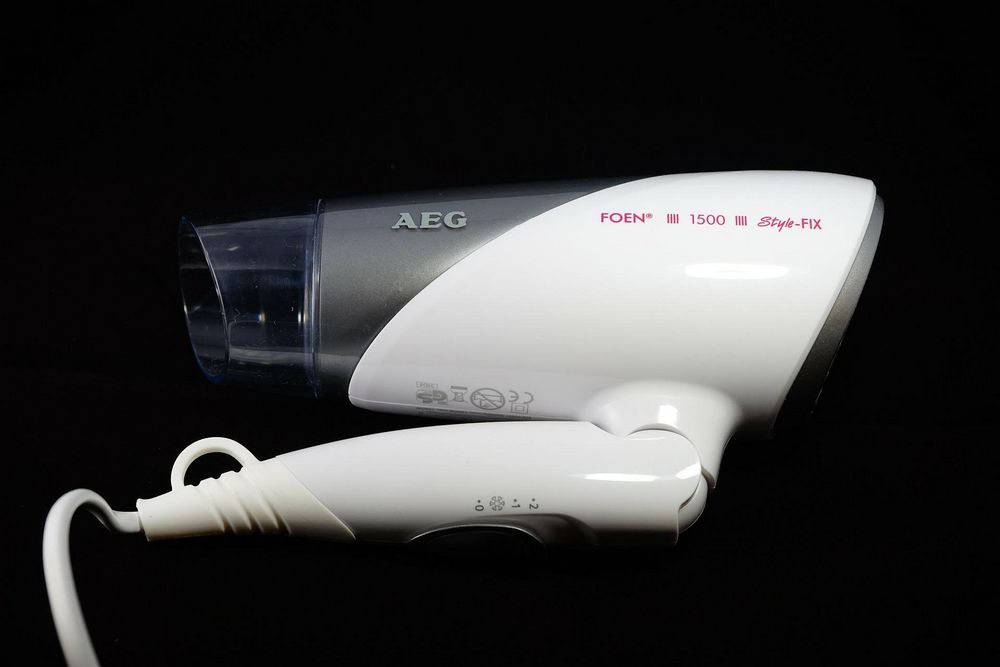
I have done it and had no issues. However, I was very careful and it is important that you are too.
Make sure that the blow-dryer is on the lowest setting and kept a decent distance away from your chinchilla while drying.
You can also take breaks during the blow-drying process every 60 seconds or so, to ensure that your pet isn’t exposed to the warm air for too long.
You also want to do this in a relatively cool room, under 70 degrees if possible.
This is to ensure that the room temperature, in addition to your low-setting and distance-kept blow-dryer does not cause too much heat for your chinchilla.
Chinchillas need to remain at an ideal temperature or they run the risk of overheating very quickly. I think you can see where I’m going with this.
A blow dryer in addition to a hot room could easily become an issue for a chinchilla. I would also recommend lightly brushing your chinchilla while doing this, to speed up the process.
Of course, some chins just won’t accept the hair dryer. Luckily you have other options. Our article on how to dry a wet chinchilla gives you 3 alternatives to a blow dryer.
Can You Shower A Chinchilla?
This far into this post, the answer should be obvious. You should not shower your chinchilla. Obviously, it is possible, but it is a very bad idea that has far too much potential to do harm and no real benefit.
Do Chinchillas Get Wet In The Wild?
No, they rarely get wet in the wild. Chinchillas are native to high altitudes and high elevations in the Andes Mountains.
This geographic location does not get much precipitation. Chinchillas in the wild are also masters of hiding and finding cover, which allows them to stay protected from any rain that does fall.
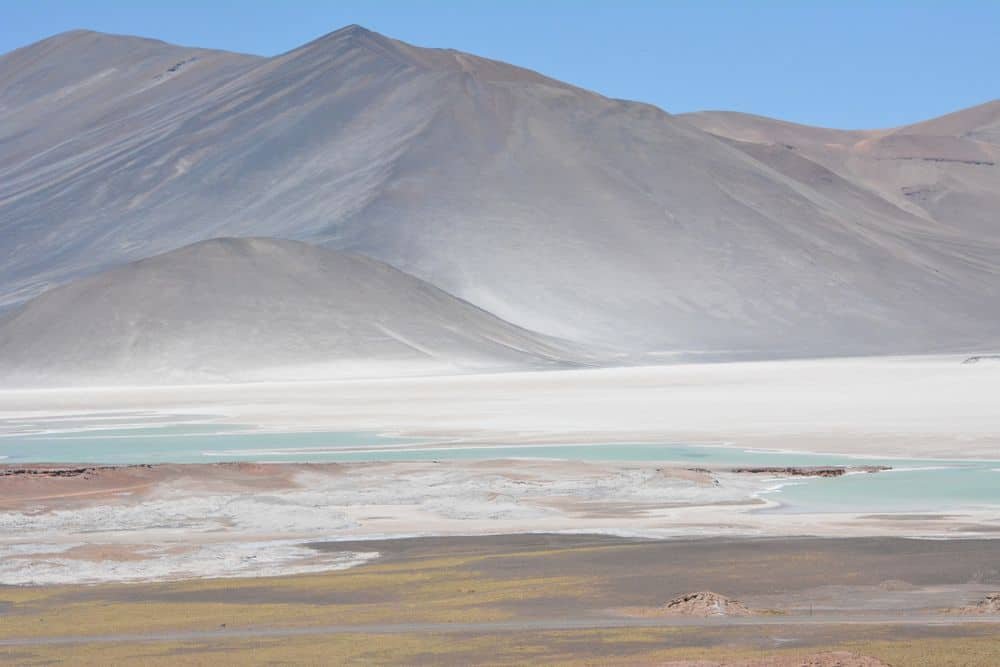
Additionally, chinchillas use natural dust and dirt to bathe themselves in the wild, as opposed to the commercially purchased chinchilla dust we use at home. But this commercial dust mimics the volcanic composition of the dust they use in nature.
Outside of never getting your chinchilla wet, you have a few other things you can do to help keep your chinchilla as clean as possible.
First, chinchillas do poop, and chinchillas do pee. It’s rare that either of these is controlled in a fashion where they pee in a litter box, although it is possible.
Yes, a chinchilla can be potty trained. However, my point is simple.
If you want to keep your pet clean, make sure you keep up with regular cage cleanings for your chinchilla.
Trust me, your chinchilla wants to remain clean, too. It doesn’t want to sleep in its own urine or poop, day in and day out.
So, let’s recap on these main points.
- No water and a chinchilla should not get wet.
- Dust baths only.
- Clean your Chinchilla cage.
Pretty simple right?
Most of the time, as far as other hygiene care, chinchillas just groom themselves.
What Do Chinchillas Do When It Rains?
As mentioned in the previous section, it rarely rains in the chinchilla’s native habitat. And when it does rain, they quickly find cover somewhere. They are usually hiding anyway, but even if they get caught in a surprise downpour, they are masters at finding cover quickly. They have to be, in order to escape from their many predators.
Chinchillas Can’t Get Wet: Final Thoughts
At the end of the day, taking care of a chinchilla is easy. It’s one of the reasons they make such good pets.
They are loving and just need some attention, dust baths, and a clean and safe environment, and they will be perfectly happy with you.
Always avoid water on or around your chinchilla, and you will be just fine.
Chili and I wish you the best of luck with your new chinchilla and the journey you have ahead of you.
Now let’s turn it over to you.
Do you have any additional information you think needs mentioned about a chinchilla getting wet?
Have you had any other situations where your chinchilla got wet?
How did you handle it?
Be sure to share those thoughts, stories, and concerns by dropping a comment below.
As always, Chili and I appreciate you stopping by and reading today and we will see you next time!
Dagro says
You forgot never feed them after midnight